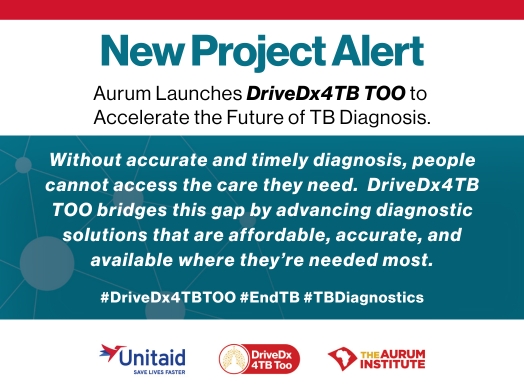The Aurum Institute is implementing a new study to assess the delivery of TB preventive treatment (TPT) in three countries, to generate critical knowledge to improve TPT uptake, implementation and outcomes.
Optimising the delivery cascade for tuberculosis preventive treatment among people living with HIV (Opt4TPT), is funded by the Bill and Melinda Gates Foundation and is being implemented in collaboration with Johns Hopkins University School of Medicine, as well as KNCV (Ethiopia), Clinton Health Access Initiative (Zimbabwe) and Ministries of Health in project countries as well as the IMPAACT4TB project. The three-year programmatic assessment will be led by Professors Violet Chihota, Aurum's Senior Lead Researcher and Hoffmann, Associate professor at the Johns Hopkins Bloomberg School of Public Health and Senior Scientist at Aurum.
Tuberculosis (TB) remains a major cause of illness around the world, and in 2019 more than 1.4 million people died from the disease. People living with HIV (PLHIV) are more likely than others to become sick with TB, and TB is one of the leading causes of death among PLHIV. TB preventive therapy (TPT), which involves giving anti-TB drugs to people with dormant TB infections, can reduce the risk of individuals developing active TB disease. But despite being recommended for PLHIV and household contacts of confirmed pulmonary TB cases, delivery and uptake of TPT have been slow and remain suboptimal globally.
Assess TPT delivery
While new innovations, such as a shorter regimen provide an opportunity to scale up TPT, to effectively scale these new TPT regimens, it is critical that we understand the barriers and facilitators to implementation. It is for this reason that the Opt4TPTT study seeks to assess TPT delivery in Ethiopia, South Africa and Zimbabwe. The objectives of the study are to; i) Quantify the TPT continuum of care- from treatment initiation to completion- among PLHIV eligible for TPT and describe reasons for TPT refusal, discontinuation and completion, including patient perceptions, adverse events, drug tolerability, incident TB and death. ii) Identify key system and provider characteristics, including models of care present in a clinic contributing to TPT prescribing, including clinic structures, clinician attitudes, and knowledge of and adherence to local TPT prescribing guidelines and iii) Conduct a cost-effectiveness analysis.
By following a cohort of PLHIV prospectively and directly observing service delivery in health facilities, Opt4TPT’s approach will provide valuable new knowledge regarding routine use of TPT, as well as outcomes during, and following, TPT. This study will create an important understanding of TPT uptake and completion from the patient perspective and delivery from the health system perspective. These results will provide actionable information for improving service delivery and the scale-up of TPT.












